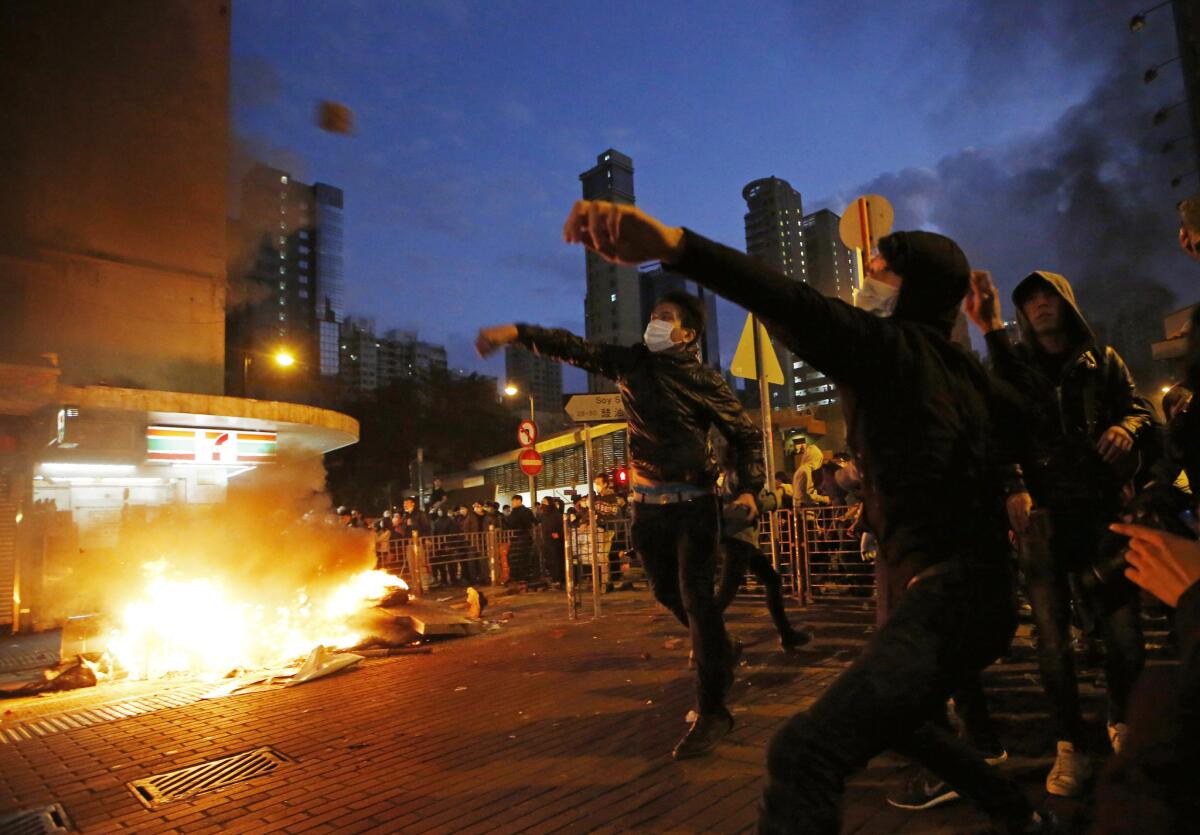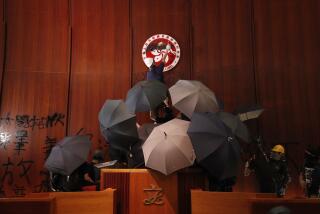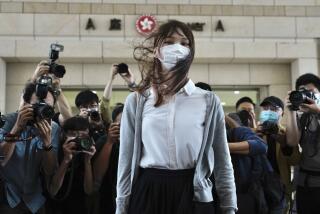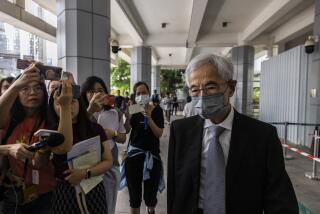In Hong Kong, calm returns after clash over vendors, but tensions remain

Rioters throw bricks at police in Hong Kong’s Mong Kok district on Feb. 9.
One night after violence erupted in Hong Kong over police treatment of snack vendors, sixth-grader Kumquat Chan was back by his parents’ side selling stinky tofu at the wildly popular but unlicensed food bazaar that has long been a local custom during the Lunar New Year holidays.
“I hope the government gives us some room to survive,” said Kumquat. “This is a Hong Kong tradition that should be preserved.”
Calm returned Tuesday to the heart of Mong Kok, a popular shopping district where a standoff over officials’ crackdown on Kumquat and other hawkers turned into full-blown street battles Monday night, marking the city’s worst unrest since massive pro-democracy “Occupy” protests in 2014. The situation grew violent after a group of “localist” activists and many ordinary citizens intervened in support of the hawkers, vowing to defend grass-roots interests in the face of local officials seen as eager to kowtow to Beijing.
Nearly 90 police officers and four journalists were injured. Many protesters were hurt, although there was no accounting of how many. So far, 61 people have been arrested, according to police.
By Tuesday evening, many vendors returned to Mong Kok, while police officers scurried around looking for potential troublemakers. Yet the tensions that sparked the protest remain unresolved, and many Hong Kong people fear that the normally peaceful city may need to brace itself for more violence.
“It’s clear that localism has on taken a political dimension over the past few years,” said Chico Leung of Hong Kong Polytechnic University, who has studied hawker policy and social movements in the city. “Compounded with resentment against police and distrust of the administration, any minor incident can escalate into a major confrontation.”
A former British colony of 7.3 million people, Hong Kong reverted to Chinese sovereignty 19 years ago as a semiautonomous territory. In recent years, however, residents have increasingly chafed at the growing economic and political heft of mainland Chinese. Localism is the term given to a movement to defend the city against the tide of political, economic and cultural influence from mainland China.
Monday’s melee made it clear that the administration of Hong Kong’s much-maligned, pro-Beijing chief executive, Leung Chun-ying, has been caught off-guard — both tactically and politically.
Brigades of traffic officers were initially dispatched to disperse the food carts clogging the roadways in protest. When one of the officers fired two warning shots skyward and then pointed his pistol at the quickly growing crowd of protesters, the confrontation descended into chaos. Riot police were deployed about an hour later.
Joshua Wong, the face of the student-led Occupy movement, said he bore witness to all this, and that violence — from both the police and the protesters — mounted from that point on. Protesters set piles of trash and cardboard boxes on fire and hurled bricks and glass bottles at police. Police hit back with batons and pepper spray.
“That the protesters resorted to a level of violence beyond public expectation to attack the police,” Wong wrote in a blog Tuesday, “only goes to show many young people, hopelessly, have reached the road of no return in our authoritative government, which wields iron-fisted control and the police as a tool to maintain stability.”
Wong is to face trial at the end of this month for his involvement in the 2014 protest.
Hong Kong lawmakers of all political stripes have roundly condemned the unrest, yet public sentiment suggests at least some degree of empathy.
Leo So, a undergraduate student in social work at a local university who came out Tuesday night to lend support to the food hawkers, said, “I can sense there’s much pent-up anger and see why the protesters used violence as means to oppose the regime.”
So watched as the hawkers huddled in an alleyway, firing up huge woks full of boiling oil and frying balls of minced fish and crispy tofu.
Internet users dubbed the unrest the “Fish Ball Revolution,” after the ubiquitous Cantonese snack.
Mass protests occur frequently in Hong Kong, but nearly all have been peaceful. At a news conference Tuesday afternoon, Hong Kong Police Commissioner Stephen Lo refused to say whether he thought the protest marked a sharp turn toward violence, but said, “Some members of the public do have an inclination to use violence or radical acts to express themselves.”
Like other localist groups that have emerged in Hong Kong in recent years, Hong Kong Indigenous, which was mobilized for Monday’s riot, has been active in mitigating the effects of a constant influx of mainland Chinese tourists. The Hong Kong government has been loath to tackle the issue.
Last year, the group mobilized protesters to harass mainland Chinese shoppers who inundate Hong Kong neighborhoods, after officials refused to work with Beijing to put a cap on visas.
While the localists’ methods aren’t universally endorsed, their goals have enjoyed widespread public support, especially where the government failed to address the issues.
“Many have lost faith in nonviolent means because this administration has been turning a deaf ear to concerns expressed that way,” said lawmaker Alan Leong from the so-called pan-democratic camp in the territory’s Legislative Council.
However, officials called the violence intolerable. “This is a riotous act through and through,” said Chief Secretary Carrie Lam. “I ask all political parties to stop finding cover for a small bunch of violent young people.”
Given that police have called the protest a riot, participants may be prosecuted under the territory’s public order ordinance and face a sentence of five to 10 years in prison. Those who are found guilty of arson may face life imprisonment.
The pan-democratic lawmakers have called for an independent inquiry chaired by a judge to look into all aspects of Monday’s unrest and said it is time for government officials to do some serious soul-searching.
“We need to understand why there is so much deep-seated anger,” said lawmaker Emily Lau. “Before long, it’ll sure explode again.”
Law is a special correspondent.
More to Read
Start your day right
Sign up for Essential California for news, features and recommendations from the L.A. Times and beyond in your inbox six days a week.
You may occasionally receive promotional content from the Los Angeles Times.






